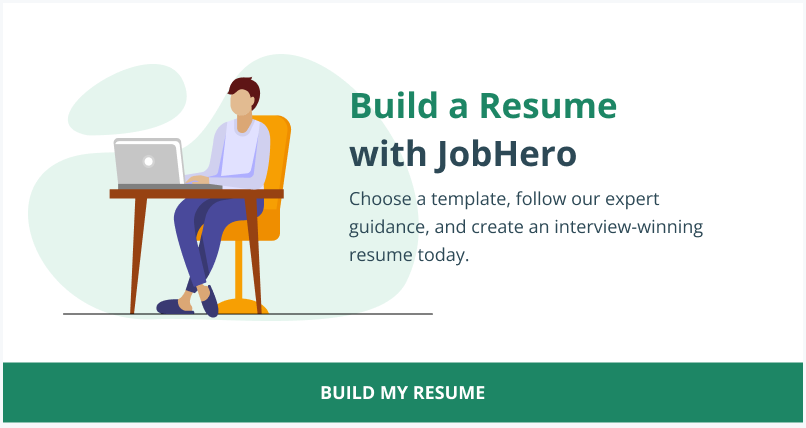This article includes all the education and training about becoming a builder, including onsite skills and a Q and A with a veteran construction builder.
Need cover letter guidance? Add a cover letter to your resume using our cover letter formats how-to guide and add value to your resume.
One extra step to impress a manager: A growing number of hiring professionals read cover letters to determine whether they’ll interview a candidate or not. Use our cover letter templates to craft a complete application that lands you the interview.

Create your professional resume in just minutes.
- Choose from 20+ recommended templates
- Add pre-written experiences, skills and summary
- Download and send
What Does a Builder Do?
Builders manage, coordinate and work on residential and commercial buildings' construction, maintenance or repair. Sometimes they supervise a project by arranging for subcontractors to complete specific jobs or to finish the work themselves. Builders also ensure that the construction project meets industry and government regulations and their client’s requirements.
The daily activity of a Builder will depend on their level of experience and specialization. The more knowledge you have, the more responsibility you will be given to train until a supervisor role opens. As a supervisor, you will delegate work, organize projects and hire specialist contractors.
A builder is responsible for various manual, managerial and administrative duties. You can expect to do the more laborious tasks of construction work like:
Preparing and clearing up construction areas.
Delivering and distributing supplies.
Helping other workers with equipment and small tasks.
Assembling and disassembling scaffolding.
Learning new skills from experienced builders.
Interpreting plans or organizing for projects to be drawn that meet building code regulations and client specifications.
Providing quotes or submitting tenders for building projects.
Ensuring that plans are submitted to local authorities for approval.
Inspecting building work regularly.
Organizing specialist contractors such as carpenters, electricians, plumbers and painters to complete building projects.
Undertaking some building work personally as needed.
Coordinating administrative tasks such as payment, calculating quantities and costs, and sourcing building materials and labor.
Supervising contractors or employees and ensuring that all teams and staff meet and maintain safety standards.
The work builders do is generally conducted in outdoor industrial conditions as part of a construction team. It may be necessary at times to operate machinery. The hazardous nature of construction work requires Builders to comply with strict safety regulations and to wear protective equipment, thus ensuring that the site is safe for all personnel.
How Do You Become a Builder?
The demand for builders is increasing. The Bureau of Labor Statistics forecasts a 15% growth for the position through 2024, amounting to a total of 37,300 openings for Builders during that period. This career growth is much faster than average growth compared to most occupations. This growth is due to population growth, which will result in the construction of more schools, hospitals, homes and other buildings.
Generally, Builders get their education through on-the-job training, apprenticeships or a degree in construction. Employers prefer expanding on any hands-on experience by studying a building course to deeper understand the theory behind the practice. Ensure the success of your builder job search by starting with a high-quality resume that highlights your skills and experience. If you need guidance, take a look at our builder resume samples.
Sign up for construction certifications:
Although formal training is required for this job, you can give yourself a serious leg up in the job search by developing crucial skills in welding, masonry, demolition, landscaping, pipeline construction or hazardous material removal. You can apply for nationally recognized certifications through the Laborers' International Union of North America (LIUNA).
Apply to a trade school or apprenticeship program:
Employers, trade unions and professional associations may also offer training for entry-level workers in the form of apprenticeship programs, which may last from three to five years and comprise on-the-job and classroom training. These programs can give you hands-on experience with signaling, blueprint reading, proper tools and equipment usage, and regional health and safety procedures. You can learn more about these programs through (LIUNA).
Consider a college degree:
Aspiring builders may pursue a bachelor's degree in construction management to increase their employment prospects. Entry-level employees with a four-year degree in construction management or a relevant field typically begin their careers in management roles. These courses cover the introduction to construction, building codes, materials testing and project scheduling. Completing a course will not only enhance your skills, but it will also help you to meet the minimum education requirements needed to apply for a Builder’s license.
Apply for the necessary building licenses and credentials:
Builders can get their credentials endorsed through the Home Builder's Institute (refer to resources below). All states require Builders to be licensed before they offer their services. Every state has licensing requirements for builders’ and contractors' licenses. You’ll need to study for your state licensing exam to register with the state board and access valuable local and state bids.
Builder Skills
As a builder, you can expect to carry huge responsibilities and manage a team of people. There is some flexibility in this career choice, but you can expect steady work from Monday to Friday and some Saturday mornings.
Self-employed or sub-contractor builders may work longer hours to meet with clients or handle administrative tasks. Seeing that much of the work is done outdoors, poor weather conditions may reduce work activity. Builders generally need to be in good health. A certain level of fitness and strength is required as you will most likely be expected to carry heavy objects regularly.
Technical skills:
Soft skills:
Insights from a Builder
In order to get an inside look at how to become a Builder, we talked to an experienced Builder Justin Beedle. This is what he had to share with us.
What is the common career path for a Builder?
All non-office personnel meaning operations personnel should have at least some field experience actually building projects. The biggest mistake the commercial construction industry is making right now is hiring individuals to be Project Managers and Superintendents without actual construction experience. There are many lumps to be taken by going this route.
The top construction individuals that I have come across in my career have all filled the following roles in construction:
Job Superintendent : The individual actually responsible for scheduling subcontractors, calling for inspections and managing the job schedule.
Estimator : The individual responsible for understanding the plans, soliciting bids from subcontractors and preparing a detailed, qualified budget for the project.
Project Manager : Individual responsible for handling the finances, contracts and owner communication for multiple projects.
Project Manager : Responsible for multiple project managers and divisions of work within the company.
Director , etc.
Having said that, there are multiple fantastic superintendents that could fill any of these roles but choose to remain in the field where they enjoy working.
What should someone consider before becoming a Builder?
This is a high stress job and environment. Dates mean everything and hitting those dates are crucial to success. It is a difficult industry because of the number of variables involved in completing a successful project. You are affected by weather, city municipalities, subcontractors who are inherently independent or they wouldn’t be in business for themselves and inspectors. Someone should also consider that in many cases there is significant travel away from home for anywhere from 120 days to multiple months or years depending on the project size. I would also consider if you want to be involved in residential construction or commercial construction because they are very different. There is many more inspections, regulations and local and national building codes that need to be followed in commercial construction. Having said that, there are far less emotional homeowners involved in commercial construction as well.
What type of person excels in this job?
People who can handle stress and constant change. Construction is nothing but overcoming many problems each day. This person needs to be ambitious, and willing to have conflict with individuals that they do not know. We try to avoid conflict but if you are someone that is uncomfortable with having tough conversations with someone, you might need to find another industry.
What do you find to be the most rewarding aspect of being a Builder?
I love driving down the road and pointing out the projects that we have built. I enjoy seeing the end result of many tough battles and seeing entrepreneurs open their first facility or their 20 th facility. It is very rewarding to me.
How Much Do Builder’s Get Paid?
Top 10 States for Builder’s Salary
Builder Resources
We looked for resources to help you become a successful Builder. The list of resources includes websites, industry associations, and books that can help you build your professional network and obtain the certifications necessary to succeed in this field.
On the Web
Builder Resources
advice on planning, marketing, managing and growing a construction business.
Builder Online
latest news on home designs, building materials, building news.
Industry Groups
American Subcontractors Association
an association that represents subcontractors & suppliers in the construction industry.
HBI
provides information on education, career development, training and placement of men and women serving the building industry.
NAHB
provides news, product information and educational resources for Builders.
Builder Books
House Builders Bible
valuable experiences and observations of a Builder on managing, buying and using materials, finding to employing the right people.
Contractor's Exam Book
provides information to pass your Builder’s examination.




